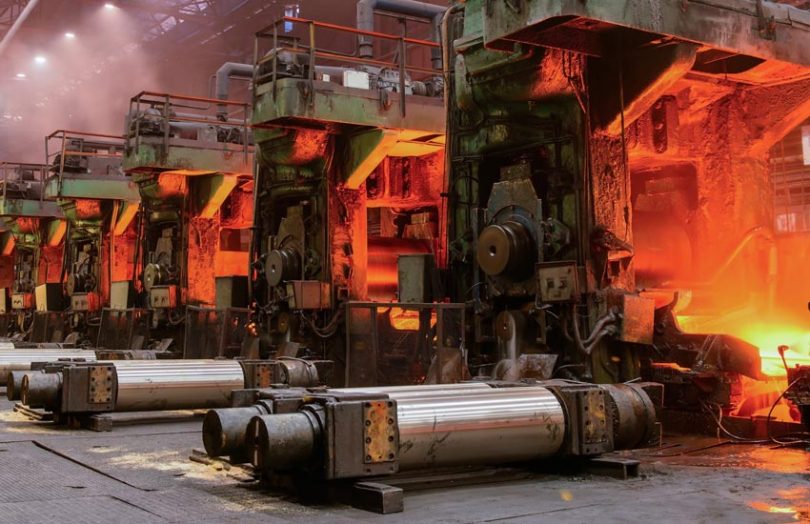China’s main trade association for metals is developing a consortium blockchain to cover the entire steel supply chain. Chen Leiming, Vice Chairman and Secretary-General of the China National Association of Metal Material Trade, outlined the development in an interview with Huoxun.
China is the world’s largest producer (51%), as well as the largest consumer of steel. The steel trade association set up the Steel Industry Chain Blockchain Alliance in 2018.
“I think that blockchain technology has a lot of room to play in the steel industry and the field of commodities,” said Leiming.
Issues in the Chinese steel sector
Leiming sees Chinese overcapacity and a lack of coordination within the supply chain as the two primary challenges facing the steel sector.
In 2019, China’s crude steel production hit 996.3 million tonnes, and consumption reached 889.8 million tonnes. Even with the excess production, the capacity is even higher.
Additionally, Leiming says there’s a lack of coordination between upstream, midstream and downstream players. He suggests using technology such as blockchain to improve productivity and efficiency in the movement of goods.
Problems with finance
Ten years ago, several cases of double-financing of warehouse goods came to light, which dampened the risk appetite of banks.
Leiming says blockchain could enable traceability of steel from mine to finished product, including storage, trading, processing and logistics. As an immutable ledger, blockchain could provide proof of provenance and reduce the risk of fraud.
While Leiming suggests this can reduce the risk of repeatedly pledging the same assets for finance, this relies on a single blockchain or interoperable platforms so that all financiers coordinate to ensure there is no double pledging.
Other steel blockchain applications
The Alliance is currently the primary blockchain consortium in the steel industry. However, a handful of blockchain use cases are being deployed in the sector.
One of the applications is for supply chain finance. In 2015, China’s state-owned steel company Baosteel helped set up an online e-commerce steel portal, Ouye Yunshang.
In 2018, the portal created the “Shanghai Commodity Blockchain Supply Chain Financial Application Demonstration Project” in conjunction with the Central Bank Digital Currency Institute. It creates a digital asset “Tongbao” representing the financed invoice liability on the blockchain.
The supply chain finance platform processed 20 billion yuan ($2.8 billion) in cumulative transactions and had over 1,000 SMEs participating at the end of October 2019. The smallest transaction was for as little as 3,800 yuan ($535).
Since then, the Tongbao assets have been bundled up as an Asset Backed Security (ABS) and listed on the Shanghai Stock Exchange.
Another initiative is a blockchain digital asset platform created by Jiwei Internet of Things. The solution enables the tracking of goods between warehouses and the transfer of cargo rights and other assets.
Lastly, Zheshang Bank has built five service platforms, including a receivables blockchain, and a warehouse receipt solution.
Consortium blockchain
Now, the Association is building a consortium chain specifically for the steel industry using blockchain, AI, IoT, and other technologies. The goal is to bring all stakeholders on a single platform and build a modern steel supply chain.
“Blockchain technology can play a role in the entire link of the steel industry, such as raw material procurement, production and processing, trade circulation, logistics and transportation, processing and distribution, and all the way to the terminal link,” said Leiming.
He added that it could also prove beneficial for financing by enabling better trust through IoT and other sensor technologies.
The blockchain project has the support of Baosteel, Wuhan Iron and Steel, Anshan Iron and Steel and other enterprises.
Other organizations backing the initiative are the China Railway Department, China Construction Department, and construction and automobile companies in some provinces and cities.
Similar projects elsewhere
Earlier this year, the Government of Canada contracted Peer Ledger and Mavennet to develop a steel traceability solution.
The U.S. Department of Homeland Security awarded a contract for using blockchain to trace raw materials like steel entering the country. As the largest importer of steel in the world, the U.S. gets about 19% of its steel from Canada.
Meanwhile, Canada’s Minehub has developed a blockchain solution for the metals and mining industry. Last year, the World Economic Forum (WEF) launched a blockchain consortium called The Mining and Metals Blockchain Initiative.






